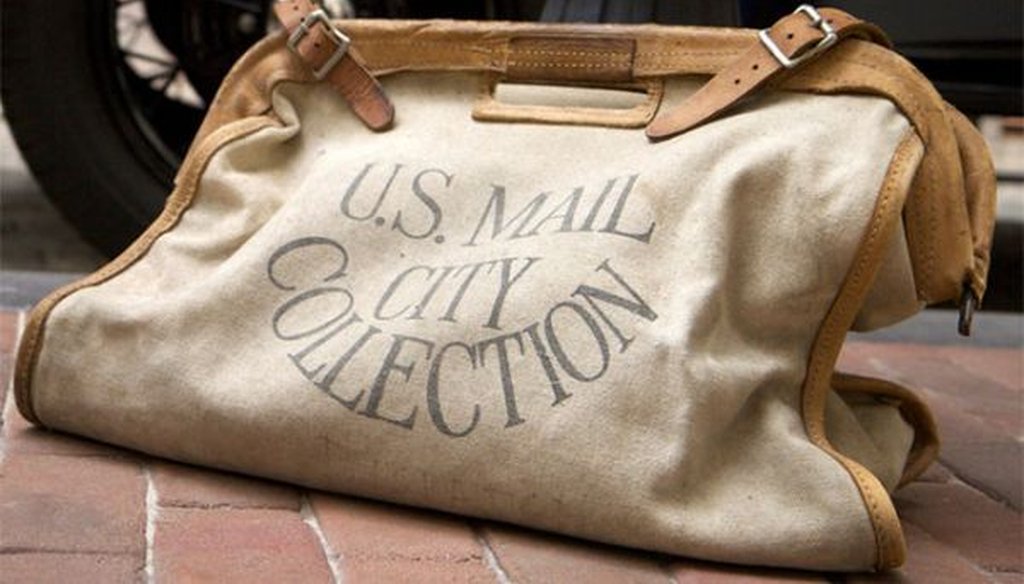Stand up for the facts!
Our only agenda is to publish the truth so you can be an informed participant in democracy.
We need your help.
I would like to contribute

Lots of readers have written us to sound off recently. Here's a sampling. (Marcin Wichary, via Flickr Creative Commons)
With tensions rising with global trading partners, trade was the leading topic that motivated PolitiFact readers to write to us in recent weeks. Here is a sampling of recent emails about trade, as well as other issues. All have been edited for space and clarity.
***
Several readers reacted to our fact-check of a statement by Rep. Kevin McCarthy, who said, "If you are talking about Canada ... our wine cannot sit on their supermarkets." We rated this Half True, noting that it was the case in British Columbia but not in every Canadian province.
One reader wrote, "In British Columbia, selling wine in supermarkets is a new thing. It’s not like the U.S., where liquor is available in virtually every store that wants to carry it. There are only a handful of grocery stores in the province -- with a population of more than 3 million -- that can carry wine, and it’s a first step in liberalization of liquor laws. So, while the congressman’s assertion is, indeed, Half True, it doesn’t reflect the enormously complicated background that resulted in the World Trade Organization challenge."
***
Sign up for PolitiFact texts
Another fact-check on U.S.-Canada trade attracted reader attention. This one checked a statement by President Donald Trump that "Canada charges the U.S. a 270% tariff on Dairy Products! They didn’t tell you that, did they? Not fair to our farmers!" We rated it Mostly True.
A reader wrote, "You are absolutely right about the tariffs. And these tariffs are intended to protect and support dairy farmers in Canada. No argument there. However, your analysis fails to recognize that the U.S. has for the longest time implemented measures to support and protect U.S. dairy farmers, but in a far different way. Under the price support program of the U.S. farm bill of 2014, as well as other measures, U.S. dairy farmers enjoy non-tariff protections that have a downward effect on the prices at which U.S. dairy farmers can sell their milk. Fair analysis requires one to look on both sides of the border.
"In other words, you could say that both Canada and the U.S. are tinkering with their domestic dairy markets and prices to the consumer. Alas, we live in an age where political posturing trumps (no pun intended) an actual desire to work things out, even amongst friends."
Meanwhile, one reader had a grammatical bone to pick with our headline for that article, which was, "Donald Trump says Canada levies 270 percent tariff on dairy. That's basically right."
The reader wrote, "’Right’ can be used to assert moral or political judgements. The words ‘correct’ or ‘accurate’ are usually better choices. In this case, is the fact correct? Or is the tariff morally right?"
***
Yet another trade-related fact-check drew criticism from readers: a statement by Trump that "the European Union … they send us Mercedes, they send us -- by the millions -- the BMWs -- cars by the millions." We rated this False. Among our pieces of evidence was that together, Mercedes, BMW and Volkswagen imported less than a million cars into the United States in 2017, not "millions."
One reader wrote, "The analysis was detailed, factual, and, commendably, it even tried to account for American carmakers and their behavior. However, it suffers from a fatal flaw. It uses figures from a single year, 2017. Nowhere in the president’s statement did he say ‘last year’ or ‘in 2017’ or anything remotely like it. President Trump is over 70 years old, and has been talking about trade imbalance issues for many years. If any assumption is to be made, it would be that he is talking about a long period of time. Using your methods, assuming only a few years would probably prove his statement correct."
***
Several readers wrote us about our fact-check of Florida Democratic gubernatorial candidate Gwen Graham, who said, "So far this year, more students have been killed in schools than soldiers in combat zones." The statement, which came after a student gunman killed 10 people in Santa Fe, Texas, in March, rated Mostly True.
Some thought we were too generous to Graham.
"This is a textbook example of lying with statistics. The data are true, but the conclusions are false. The correct conclusion is that combatants are at vastly greater risk of death than students in schools. Graham's statement is ultimately unhelpful in understanding the problem of school shootings or advancing the search for solutions."
But another reader thought our rating was too harsh.
"You show that what she said was accurate -- that is, ‘true.’ Yet, you still give her only a Mostly True, because you give her statement an intention that was not part of her comment. Nowhere does she suggest that schools are inherently more dangerous than war zones. Everyone knows that war zones are more dangerous than schools. But, that in itself is the point. We expect that people have an increased chance to meet a violent death in war zones. We do not expect them to face that danger in a school or a park or a mall."
A third wrote that the equating the two was distasteful.
"I object to this kind of comparison. The voluntary sacrifice of our military who intentionally put themselves in harm's way on our behalf should not be compared to the wanton murder of children. It trivializes both instances."
***
A few readers saw signs of bias against Trump in some of our recent coverage. For instance, one found fault with our story "What Donald Trump got wrong in his Tennessee rally for Marsha Blackburn."
"You were more than happy to label inaccurate statements but you didn't label accurate statements as any version of True. The whole reason you go through this exercise is to make sure that the reader gets accurate and unbiased information. Of all organizations, PolitiFact should be hyper-aware of creeping bias in what it publishes. By not doing so you undermine the credibility of your organization and the press as a whole. Ya gotta do better."
***
One reader thought it was wrong for us to run the article headlined, "Democrats’ playbook for stopping Donald Trump’s Supreme Court pick." It was an explanatory piece and did not receive a rating.
The reader wrote, "While this article has a lot of good information, it is not worthy of a fact-checking site. I realize the subject of a nominee to the Supreme Court is important and most reporters want to weigh in, but I go to other sites for news and speculation about what actions various factions or parties may take. I come to PolitiFact to verify the information provided by other sites who purportedly have inside information or have done some research. In summary, good article, wrong forum."
***
One reader expressed skepticism with our False rating for the statement by the Trump-supporting duo Diamond and Silk that President Barack Obama "secretly gave citizenship to 2,500 Iranians as part of nuke deal." We noted that the allegation stems from comments by Hojjat al-Islam Mojtaba Zolnour, an Iranian official who made the allegation during an interview with the country’s Etemad newspaper and was cited by the country’s semi-official Fars News agency. The report didn’t appear to include any actual evidence.
The reader wrote, "Let me get this straight. We’re told to believe Iran when it comes to their nuclear program, but not to believe them when one of their own said this?"
***
One reader wondered whether our longstanding rating "Pants on Fire" was a good fit for the current era.
They wrote, "Your continued use of ‘Pants on Fire’ strikes me as increasingly off-tone by watering down the impact a total falsehood to something childish. Children are generally forgiven for their errors. Maybe it just seemed fun to use the term as branding. I also understand the difficulty in labeling something a ‘lie.’ But I think there must be a more appropriate term to use -- one that doesn't diminish your point by likening it to playground stuff."
***
Some readers wrote us to express their appreciation for our work.
One wrote, "I spend significant time double-checking PolitiFact just to be sure. It helps to have issues rescued from the deluge of nonsense. Thank you and your team for trying to keep pace with the truth."
And another wrote, "PolitiFact is one of the great and necessary vehicles in America. Keep up the good work!"
Our Sources
Emails from PolitiFact readers














































